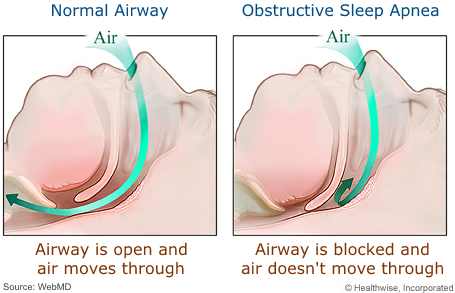About Sleep Apnea
Sleep apnea occurs when people stop breathing and gasp for breath during sleep. It is often associated with chronic, loud snoring and is caused by a block in the upper airway. The block occurs when the soft tissue in the rear of the throat relaxes too much. The tissue then partially or completely blocks the airway.

The pauses between breaths can last from 10 seconds to two minutes and take place for 20 to 30 minutes per hour. This condition is serious and has been known to cause sudden death.
Symptoms
This sleep condition can be devastating to the sufferer - physically and emotionally. It can cause depression, mood problems, headaches, and an inability to think clearly or concentrate.
If left untreated, the condition can lead to major health concerns, including high blood pressure, obesity, heart disease, stroke and diabetes.
If you or a loved one suspect apnea or any type of sleep issue, make an appointment to see your doctor right away.
Causes
About 18 million adults suffer from the condition, and many of these people are overweight. The condition is more common in males and in the middle-aged.
Data shows that it is also found more frequently among African Americans, Asians, Native Americans, and Hispanics than in the Caucasian population.
Sufferers often have enlarged adenoids and tonsils, congestion caused by allergies or other sinus conditions, body shapes that are conducive to the disorder, and a family history of the condition.
Treatment
For mild cases, lifestyles and behavioral accommodations can help alleviate some of the symptoms. These include:
- Losing excess weight
- Sleeping on your side instead of your back
- Avoiding alcohol consumption
- Stopping smoking
- Avoiding medications that promote sleepiness
Medical intervention is necessary to determine the extent of the condition and its associated health risks. Doctors who suspect apnea will request a comprehensive sleep study to determine if the diagnosis is correct.
Once diagnosed, the condition is often treated with the use of a Continuous Positive Airway Pressure machine, known as a CPAP, during sleep.
This assistive machine provides an even and continuous flow of air through a mask and creates pressure that forces the airways to remain open and function properly.
The CPAP is not without side effects, which can include nasal, nose and skin irritation, as well as bloated stomach, sore eyes, and headaches.
Other treatments include the use of snoring mouthpieces, dental devices, and corrective surgery. Surgery solutions may include removing tonsils, adenoids, and/or additional soft tissue from the throat and nose. Reconstructive surgery to the jaw is another surgical option that may control symptoms.
Related Information - Sleep Apnea
Watch for These Symptoms
Causes of Sleep Apnea
Apnea reatments
Can It Cause Death?
Sleep Issues and Cancer Link?
Sleep Disorders
Weight Gain with Sleep Breathing Issues
What is a Sleep Study
Tips on Buying CPAP Equipment Online
When to Replace CPAP Supplies
Share Sleep Tips Do you have a great tip to share with others who are struggling with sleep? What works for you might help someone else. |



